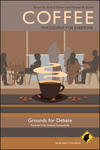Coffee: Grounds for Debate (Philosophy for Everyone)
 Coffee - Philosophy for Everyone: Grounds for DebateISBN: 978-1-4443-3712-9
Paperback
264 pages
March 2011, Wiley-Blackwell
This is a Print-on-Demand title. It will be printed specifically to fill your order. Please allow an additional 10-15 days delivery time. The book is not returnable.
Learn more about this book
|
|||||||
Coffee: Grounds for Debate (Philosophy for Everyone)
The world consumes 500 billion cups of coffee per year. Caffeine is one of the most widely taken psychoactive drugs on earth, and coffee is its foremost delivery system. Coffee: Grounds for Debate (March 2011) asks how and why we have come to prefer the infused beverage as one of our most popular drinks and how our chief indulgence and symbol of “the good life” has become a source of full-bodied ethical, aesthetic, and environmental philosophical debate.
Coffee has suffered a chequered history, and was banned from ancient communities, including Mohammed’s Mecca, for its “sinful” qualities. Pope Clement VIII once said upon tasting coffee for the first time, “Why this Satan’s drink is so delicious.” It has been accused of having the ability to stunt growth, cause cancer, and weaken bones. Just as certain tropical plants have evolved with caffeine as an ingredient to protect themselves against predators, coffee has developed delicious and economically viable qualities that has allowed it to withstood and outgrow its naysayers.
Perhaps you have had the pleasure of musing philosophy over a cup of Turkish coffee and pain au chocolat in a local café on a rainy day, as Will Buckingham recalls in his essay “Three Cups: The Anatomy of a Wasted Afternoon.” Or perhaps you have stood dumbfounded while looking at a coffee label on a bag of fresh roast, thinking what is the difference between fair trade and direct trade, is it shade-grown and organic, or is it from a Robusta or Arabica? The aesthetic, practical, and ethical concerns of coffee have been cultivated throughout history, starting with its roots in Ethiopia with the ingestion of its energy giving seeds, to the first practice of roasting in the 15th century, and through to the present-day third wave, boutique, specialty coffee movement (as recounted in John Hartmann’s “Starbucks and the Third Wave.”)
In “Black Puddle Water or Panacea” Mark Pendergrast tells us that by the 17th century coffee had staked its claim within society as a powerful intellectual stimulant and alternative to beer. Public coffeehouses, or in Britain known as “penny universities,” became the choice meeting places of activists planning the French Revolution, and later the Boston Tea Party. Well-known imbibers include Voltaire, Johann Sebastian Bach, and Sartre.
So what is the coffeehouse now? How and where do we prefer to “take” our coffee? Jill Hernandez describes the local, neighborhood coffeehouse as the ideal environment for the modern, optimistic existentialist in her essay “The Existential Ground of True Community.” Asaf Bar-Tura draws upon the philosophy of Hannah Arendt in his essay “The Coffeehouse as a Public Sphere,” and points out that the modern coffeehouse fits the mold for the contemporary need for a place between home and work, or “a private space within the public space.”
Now think of the first time you ever tried coffee. Did it taste like “black puddle water” or “frothy goodness”? Probably the former. In “The Necessary Ground of Being” Michael W. Austin relays his first experiences as a coffee drinker and how his chance meeting with the bean relates to thinking of morality within theistic or naturalistic frameworks. In “Sage Advice from Ben’s Mom” Scott F. Parker teaches us that “doing philosophy” requires nothing more than a few good friends, the neutral territory of a café, a cup of joe, an open mind, and a willingness to speak in the spirit of Socrates. So easy ‘Ben’s Mom’ can do it.
In essays such as “The Unexamined Cup is Not Worth Drinking,” and “Is Starbucks Really Better than Brand X?” Kristopher G. Phillips and Kenneth Davids decode abstract coffee jargon such as acidity, body, and viscosity with barista-like gusto, and tackle a cross-comparison of leading coffee brands using Nagel’s consciousness philosophy. In the spirit of Hume’s moral theory, Phillips also gives us an excuse to go ahead and drink the best coffee one can possibly find. Steven Geisz enlightens us on the Indian and Buddhist philosophies of sams?ra within the perspective of a coffee drinker’s excruciatingly painful but cathartic morning ritual.
Drawing upon philosophical heavyweights such as Kant, Aristotle, Satre, Socrates, Wittgenstein, and Nietzsche, philosophers, journalists, experts, historians, and coffee insiders consider how the ethics of coffee agriculture, processing, retail, and consumption connect to the aesthetics, metaphysics, and cultural implications of one of the world’s most popular drinks.
Featured writers include Mark Pendergrast, Ken Davids, and the Coffee Bean Guys James Kirkland and Dan Levy. Coffee insiders such as Matt Lounsbury of Stumptown Coffee (in an interview with editor Scott F. Parker) and Donald Schoenholt, President at Gillies Coffee Company, offer insights into the pioneering spirit and background of coffee’s ‘third wave’ coffee movement. Essays cover broad ground such as the ethics of coffee agriculture, caffeine as a performance-enhancing drug, and the centrality of the coffee house to the public sphere.




